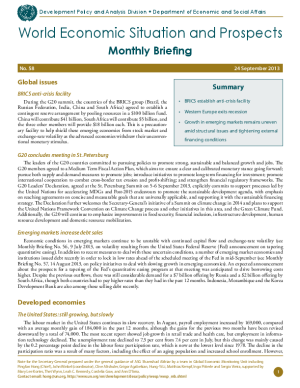September 2013
Summary:
- BRICS?establish?anti-crisis?facility
- Western?Europe?exits?recession
- Growth?in?emerging?markets?remains?uneven amid?structural?issues?and?tightening?external?financing?conditions
During the G20 summit, the countries of the BRICS group (Brazil, the?Russian Federation, India, China and South Africa) agreed to establish a?contingent reserve arrangement by pooling resources in a $100 billion fund.?China will contribute $41 billion, South Africa will contribute $5 billion, and?the three other members will provide $18 billion each. This is a precautionary facility to help shield these emerging economies from stock market and?exchange-rate volatility as the advanced economies withdraw their unconventional monetary stimulus.
?
The leaders of the G20 countries committed to pursuing policies to promote strong, sustainable and balanced growth and jobs. The?G20 members agreed to a Medium Term Fiscal Action Plan, which aims to: ensure a clear and calibrated monetary stance going forward;?pursue both supply and demand measures to promote jobs; introduce initiatives to promote long-term financing for investment; promote?international cooperation to combat cross-border tax evasion and profit-shifting; and strengthen financial regulatory frameworks. The?G20 Leaders? Declaration, agreed at the St. Petersburg Summit on 5-6 September 2013, explicitly commits to support processes led by?the United Nations for accelerating MDGs and Post-2015 endeavours to promote the sustainable development agenda, with emphasis?on reaching agreements on concise and measurable goals that are universally applicable, and supporting it with the sustainable financing?strategy.
?
Download the World Economic Situation and Prospects Monthly Briefing No. 58
 Welcome to the United Nations
Welcome to the United Nations
